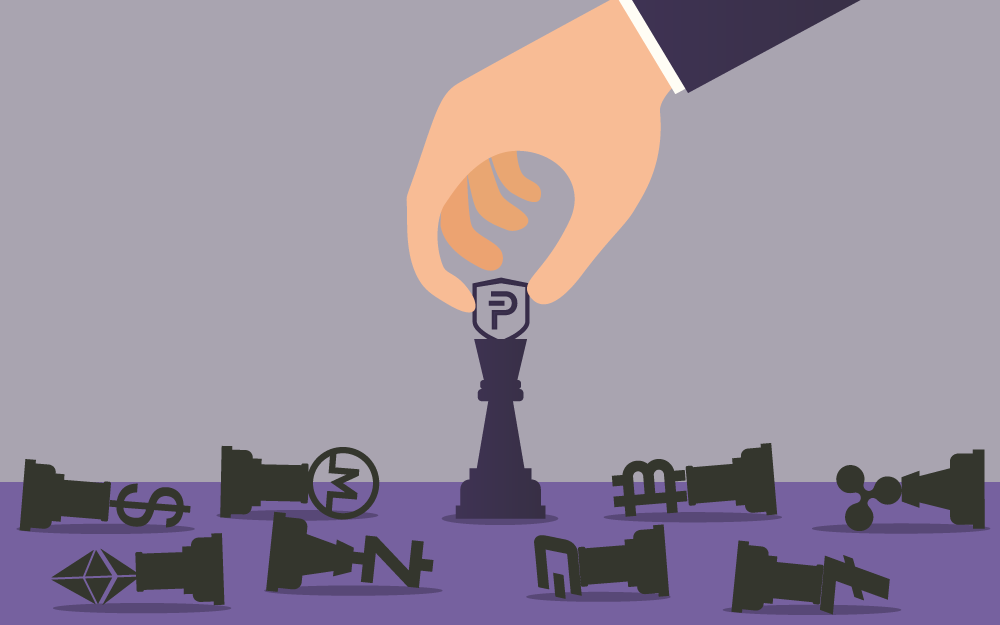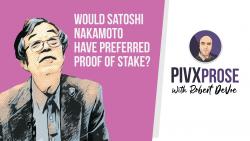
When I think about the future of money, it can be fun to imagine a world that runs purely on Bitcoin. Each time you buy a book or get paid, units of Bitcoin will move from address to address in the blink of an eye. But is this really the best scenario for the future of the world economy?
In my opinion, no. And that’s not saying anything against Bitcoin, either. I think Bitcoin is great. Instead, putting all of the world’s economic value onto a single blockchain is risky, and could have a number of unintended side effects. I also don’t believe that fiat currencies will disappear completely. That would only happen if countries, as we know them today, ceased to exist.
In a future where cryptocurrency payments are ubiquitous, how will we reconcile differences between these disparate networks and means of payment? How will PIVX fit in?
There will never be a single unified world currency
Money as we know it is a strange thing. It seems to defy logic, and yet it can generally fulfill our need for liquid value. Any form of money has no value, intrinsically. You can’t eat a dollar bill, and you can’t build a sturdy house out of stacks of euros. Obviously, the same can be said for any of the thousands of cryptocurrencies on the markets today, too.
We value these forms of money because they have reached a critical point where we can all agree on what they represent and what can be exchanged for them.
But not all currencies are created equal. Some may have too high of a value, and thus, too low of a resolution. It’s entirely possible that with a fully connected global economy, transactions that would be valued at less than 1/1000th of a cent could be commonplace. Thus a currency that is only divisible into whole cents is not sufficient for this.
Transaction fees and the cost of moving money are other points to consider. If a type of money is designed to move infrequently and be a long-term store of value, a slightly higher transaction fee is not a significant issue. For rapid, small value transactions, the opposite would be true.
Another issue to consider in choosing money is ideology. If, for example, you find yourself at odds with the political ideology of North Korea, it would make sense for you to avoid using that nation’s currency (assuming it was accepted in other countries). That’s because using any kind of currency supports its adoption and thus can bolster its valuation.
Rogue nations aside, we have seen numerous splits of cryptocurrency projects due to differences in ideology. Just to name a few, there is Bitcoin and Bitcoin Cash, Ethereum and Ethereum Classic, Bitcoin and Litecoin, and so on. These currencies split and their progeny found support due to a demand in the market for what they represent. It’s not always political, either. It could purely be a difference of target demographics, intent, or technology.
Given the way the market stands today, it would be foolish to think that it would ever be possible for a single world currency to arise and completely dominate. It’s entirely possible that a single currency could become the most popular, but popularity does not mean absolute domination. McDonald’s may be extremely popular, but they have countless competitors.
Finding a place for PIVX
Like all other successful cryptocurrencies, PIVX was created to fill a specific purpose. That purpose was to be the best privacy coin that utilized proof-of-stake instead of wasteful proof-of-work mining.
There are, of course, many other privacy-centric cryptocurrencies. However, much like there are differences between Bitcoin and Bitcoin Cash, we too have attributes that make us unique. Even if you consider the many hundreds of coins that have made use of our code and clones PIVX, they lack one critical element that made us more than a mere technological success, our Community.
A unique need
Over the next several decades, I imagine that a large portion of the cryptocurrencies that exist today will disappear. This will most likely be because they lacked a purpose or use case. These are what I like to call “me too coins”. They are generally created by forking or copying the code base of another project, slapping on a new label, and trying to market it without having a good excuse for existing, other than trying to enrich the creators.
One example I like to use is a project called BBQ Coin. At one point, BBQ Coin had a market cap of several million dollars. However, BBQ Coin served no purpose, didn’t innovate, and generally failed to have a point. It was, in its truest sense, a me-too coin. Today, BBQ Coin is relegated to the dustbin of cryptocurrency history.
As this mass filtration process rids us of useless, directionless, and voiceless coins, the useful coins (and tokens) will slowly but surely move into the foreground.
Many coins, one purpose
As there will never be one penultimate currency, my thought is that we will someday find ourselves regularly using multiple currencies. Having our wealth spread across multiple forms of money can help protect us from hyperinflation, market manipulation, and even local recessions.
Think of it this way – if you are a Canadian and keep all of your money in Canadian dollars, a national recession in Canada could greatly harm your savings and investments. The same could be said for keeping all of one’s value in any single currency (including a single cryptocurrency).
The consumers, savers, and investors of the future could find themselves protected against these events to a degree that would be mostly unheard of today. It’s not a perfect solution, but it would empower individuals to have the option to protect themselves by spreading their wealth across uncorrelated assets.
I believe that PIVX could be one of the most important assets in this potential future. That’s because it represents not only a store of value with low transaction fees, but a way to safely and securely store wealth away from prying eyes that would track and trace and analyze it. It is also a way to generate wealth through staking and masternode ownership.
I don’t believe that PIVX will ever become the ultimate world currency. And it shouldn’t. We shouldn’t have a single world currency. We need lots of them. And they need to represent us and our diversity of needs and goals.
What’s your take? Will there ever be a unified world currency, or are we better off with lots of different choices? Let us know in the comments below.






